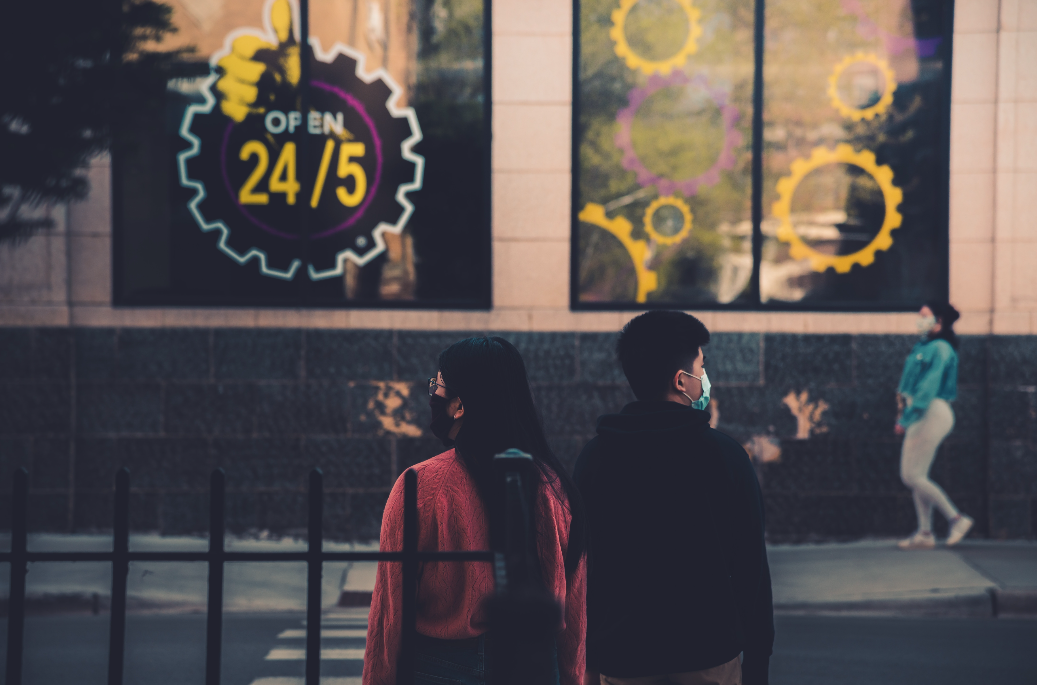Coronavirus: Brand Moves
Week: May 18th – 22nd
by Interbrand
The latest of Interbrand’s regular round-ups of brands’ responses to the global COVID-19 pandemic

Technology
Facebook is to acquire Giphy, a leading service for making and sharing GIFs, which will become part of Instagram. “By bringing Instagram and Giphy together, we can make it easier for people to find the perfect GIFs and stickers in Stories and Direct,” Vishal Shah, vice president of product at Instagram, said. Giphy’s tools are already integrated with many Facebook competitors, including Twitter, Snapchat, Slack, Reddit, TikTok and Bumble, and both companies have said that Giphy’s outside partners will continue to have the same access to its library and API. But now Facebook, ultimately, will be the gatekeeper for all those integrations, and it will have unprecedented insight into how people use GIFs.
Online dating platform Tinder has announced plans to add a video dating feature as a response to the threat posed by coronavirus in slowing its user growth. Its rival apps have already latched on to the trend for face-to-face calls – Bumble, for instance, introduced a video and voice call feature last year, while Hinge launched its own ‘Date From Home’ feature at the start of lockdown in March.
“This specifically came out as a response to listening to our customers and their needs during the quarantine and figuring out a way how we could serve them best,” Hinge’s chief marketing officer, Nathan Roth said. “During social isolation, everyone has had to adapt their dating strategies to use virtual solutions, such as video dating,” explained Naomi Walkland, associate director for EMEA marketing at Bumble.
She explained that overall: “data indicates a trend of increased use by our new and existing users, especially in regards to the chat, video call, and voice call features. We have seen users spending more time speaking to each other on the app, with call durations averaging at 21 minutes as well as a 12% increase in messaging. Globally on OkCupid, there has been a 30% overall increase in messages sent each day since March 11. Matches have increased by 10% and conversations increased by over 20% as singles turned to online dating.
Houseparty, the video chat app that has seen a surge of growth during quarantine, is expanding into watching live video with friends. The company launched its first experiential event series, called In The House, which featured more than 40 celebrities who danced, talked, cooked, sang and more over the course of three days.
The company doesn’t see this weekend’s virtual celeb party as a one-off event, but as the first of many live co-watching experiences. “While many entertainers have turned to performing online during these unprecedented times, this event is different from anything that has happened in the past few months. This is not just another virtual music festival, but a curation of shared experiences” said Houseparty spokesperson Kimberly Baumgarten.
“Now that we have this live player it allows us to create more interactive experiences for our users to enjoy together in the future. This content will be additive to the Houseparty video chat experience for our users,” she said. Watching video together is an activity that’s been booming during quarantine, as friends binge Netflix together through extensions like Netflix Party or join Twitch “Watch Parties.”
Software specialists Adobe are extending the trial length of their business-focused Adobe Sign electronic signature package to 90 days “This will help companies of all sizes with business continuity and working remotely,” said the company. They’re also offering limited-time pricing on Adobe Sign Small Business subscriptions in certain regions. Adobe Sign is a cloud-based e-signature solution that lets users replace paper-and-ink signature processes with automated electronic signature workflows to send, sign, track, and manage signature processes using a browser or mobile device. It also allows use of turnkey integrations and APIs to include e-signature workflows in enterprise apps and systems of record.
Travel & Hospitality
Travel giant Tui has just set out a road map for restarting the industry as the coronavirus pandemic eases. The company plans to run holidays at scale from July. “Summer holidays are possible responsibly and with clear rules,” chief executive Fritz Joussen said. The company says it is “ready for an early resumption of travel activities in Germany and Europe”.
It has also announced a range of safety measures designed to reduce the risk of infection. Passengers on Tui flights will fill in health questionnaires and screened before boarding with a temperature scan. They must wear face masks during the journey. Boarding of aircraft will be staggered, with more buses deployed where necessary.
At the destination, Tui has promised “implementation of 1.5-2 meter safety distance”. There will be fewer tables in restaurants, with extended opening hours to compensate, and a serviced buffet instead of the traditional self-service buffet with priority on open-air seating spaces. Tui will try to arrange “Increased availability of outdoor activities,” and its excursions will involve smaller groups.
On Tui’s cruises, buffets will be closed and only every third seat will be occupied in theatre. “Frequently touched surfaces” will be cleaned every 30 minutes, and there will be additional health staff onboard – with Covid-19 testing devices on board. UK sales for the winter of 2020-21 are up 8 per cent, and the first bookings for summer 2021 have more than doubled.
Online accommodation booker Airbnb, which has cut 1,900 employees – 25 percent of its workforce ¬– is providing a showcase for ex-staff in the form of a public talent directory. Laid-off employees can opt in to have their LinkedIn profiles, bios and work samples posted online. The website is being widely shared by Airbnb employees across social media. The list of ex-employees being posted to its talent directory reflects Airbnb’s change in strategy.
Sports & Entertainment
The German Bundesliga soccer league has returned to action after a 61-day hiatus. It is the first of Europe’s elite leagues to return to action and as the English Premier League, Italian Serie A and Spanish La Liga attempt to get their 2019-20 seasons back and completed, the Bundesliga will be under the spotlight.
In Germany, most of the clubs went back to training at the start of April. Players and staff are tested twice a week. In matchday weeks, the players are tested the day prior to a match and on another occasion during the week (in double match weeks, players will be tested before both matches).
They are given two tests to help prevent false results. Results are then given to the team’s head doctor at 10am on the morning of the matches. The teams are also being given antibody tests. At top team Bayer Leverkusen, the players receive a message every morning on their phone, asking five questions about how they are feeling.
Depending on their answers, they are then granted permission to go to training where on arrival, their temperature is checked. Players are not allowed to have physical contact with neighbors or public, must respect the six-foot social distancing rule, are not allowed visitors at home, and are prohibited from using public transport. These rules apply to everyone who lives in the player’s household. They also need to keep a note of all the people they are in contact with and if someone breaks the social distancing rules, players are recommended to go back into quarantine until they have been tested.
Large global brands are to cut ad spend harder, and for longer, in response to the coronavirus pandemic, according to new research from the World Federation of Advertisers (WFA). 89% of large multinational companies have deferred marketing campaigns this month, up from 81% in March, found data from the trade body’s Covid-19 response tracker.
52% of marketers at these companies said they’ll now hold back ad spend for six months or more, compared to just 19% who mulled taking similar medium-term action last month. The WFA’s research was conducted in the last full week of April and attracted responses from senior marketers in 38 companies across 17 sectors with a total annual global spend of $46bn. 61% of respondents held global positions, with 39% in regional roles. In line with advice to keep spending in a time of crisis, some 62% of respondents agreed it was critical for brands not “to go dark” during this period. However, there were still dramatic cuts to spend overall in April.
Covid-19 has disrupted the world of music streaming – but children’s music has been a winner from the recent changes in consumption. In the US, the number of total on-demand streams were recently down from 18.3 billion to 16.6 billion, a drop of about 10%, according to data from BuzzAngle. The data includes all major streaming providers, including Spotify, Apple Music and Pandora.
But not every artist’s streams are suffering equally. The rapper Cardi B has been one of the major artists to see their streams take the largest dip. Her music was streamed 12 million times in the last week of February, but only about 10 million times in the last week of March, a decline about 17.5%. Over the same period, the Rolling Stones saw their streams drop less than 4%. Kidz Bop, though, a band that makes versions of pop hits sung by children with lyrics modified for kids, saw a jump of about 10%.
With parents needing to entertain their kids all day, the rise of children’s music has an obvious explanation. However, a large share of music streaming occurs during commutes, and many people are no longer heading into work. There is also a decline in music streaming from the hospitality industry. Many of the restaurants, coffee shops, and stores that would normally stream music all day are shut down.
Retail & Manufacturing
Procter & Gamble and Shopee are scaling up the FMCG giant’s ‘Show Me My Home’ concept with the aim of making digital transactions more tangible for shoppers. Originally designed for the physical store experience, ‘Show Me My Home’ has been taken online via Shopee’s e-commerce platform. The website takes shoppers through a P&G product shopping experience, categorizing products by rooms of the house.
Kim Dong Hyun, regional director, e-commerce for APAC Middle East and Africa at P&G says the concept originated from insights into the way people think and act when they are shopping. “This campaign is designed to help consumers by making a digital platform more realistic. Our setup of different rooms creates an experience that enables shoppers to find what they need faster and easier. These rooms act as more natural categories that trigger remembering forgotten items and encourage a better shopping experience,” he says.
“Facilitating these category adjacencies or associations makes the shopping experience more natural. We use this strategy in brick-and-mortar stores. We wanted to execute this strategy on an e-commerce platform,” adds Kim.
British grocery delivery company Ocado has been coping with an unprecedented volume of orders by “reduced complexity” – temporarily making some items unavailable to serve more customers. “As an example,” chief financial officer Duncan Tatton-Brown explained, “suspending the delivery of mineral water has allowed us to deliver to 6,000 additional households.”
Ocado has struggled to meet demand for its grocery service since the coronavirus pandemic set in. Tatton-Brown said on May 6 that sales for the current quarter are (so far) up 40% from the same time last year, and that the company is delivering to more households than ever before. Meanwhile in the US, contract workers for online grocery service Instacart have long complained about orders that require them to pack, carry, and transport bulky, heavy items, like bottled water and bags of ice.
“Definitely not worth the backache or wear and tear on the vehicle,” an Instacart shopper offered $15.83 to deliver 45 cases of water from retailer Sam’s Club told tech site Ars Technica. In Ocado’s case, efficiency gains have also come from customers placing fewer, bigger orders than they did before. “It’s much quicker to deliver one double-sized order than two half-sized orders,” Tatton- Brown said last week.
According to new survey data from McKinsey & Co, 20% of shoppers have left their primary grocery store in favor of another during the crisis, and 37% of those who’ve made the switch expect to remain loyal to the new retailer after the crisis ends.
The main reasons people stopped shopping at their primary grocer were constant problems with keeping the shelves full and better ecommerce offerings elsewhere.
Another contributing factor was that consumers opted for a store that was located closer to their home or place of work. McKinsey estimates that prior to Covid-19, about 3% of U.S. households were purchasing groceries online. That rate has since surged to between 8% and 10%. While the firm expects those numbers to decline as states begin relaxing their shelter-in-place orders, it predicts they’ll remain higher than they were prior to the outbreak.
“What it means for grocers is that you really need to double down on building out your ecommerce capabilities,” said Steven Begley, a partner at McKinsey.
Property & Finance
According to Allianz research, coronavirus could prove fatal to as many as 9 percent of SMEs in Germany and 11 percent in the six largest economies in Europe this year. The researchers forecast a hit of as much as 1.34 trillion euros to the Eurozone economy from the pathogen.
To protect hitherto healthy German companies, including SMEs, from ruin and prevent a domino effect on supply chains, Allianz’s trade credit insurer Euler Hermes has joined up with Germany’s federal government and the German Insurance Association.
Under the initiative, the government will backstop losses of 30 billion euros for trade credit insurers this year to cover payment defaults by clients of German companies. Euler Hermes and the other participating insurers will transfer 65 percent of their premium income to the government, in addition to covering losses of up to 500 million euros and all default risks exceeding the 30 billion euros of the government guarantees. Euler Hermes also reached an agreement with the French government, leading the negotiations together with other insurers and insurance associations to develop economic support solutions.
A similar scheme was announced in Belgium through collaboration with credit insurers, governments, and trade associations. To soften the blow to SMEs, Allianz Spain has initiated several support measures, including delaying premium payments for up to 120 days, while Allianz France has pledged to contribute up to 28 million euros of the 400 million euros that the French Insurance Federation is donating to a French government fund aimed at helping small companies and independent workers.
Remote working is continuing to affect the property market; Since the pandemic, Google’s parent company Alphabet has pulled out of deals to acquire more than two million square feet of office space, including what would have been the biggest real estate deal in the Bay Area.
James Gorman, the CEO of Morgan Stanley, recently said that the company has proven it can operate with “effectively no footprint” and will have “much less real estate” in the future. Insurer and financial services provider Nationwide has announced plans to close five offices, permanently transitioning those employees to working from home. Meanwhile, Twitter will allow its employees to work from home “forever”, chief executive officer Jack Dorsey has said in a company wide email.
A spokesperson said the company was “one of the first companies to go to a work-from-home model” due to Covid-19 but does not anticipate being one of the first to return to its offices. “We were uniquely positioned to respond quickly and allow folks to work from home given our emphasis on decentralization and supporting a distributed workforce capable of working from anywhere,” the company said.
“The past few months have proven we can make that work. So, if our employees are in a role and situation that enables them to work from home and they want to continue to do so forever, we will make that happen.” Twitter has suspended almost all employee business travel and all its in-person events until 2021. It is also giving employees increased allowances to buy home office supplies including desks and chairs.
To read the full report, please download here.
To access daily Brand Moves, please visit www.brandchannel.com.





